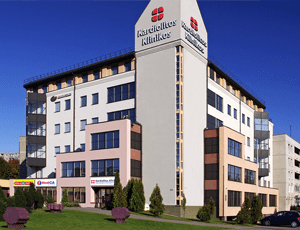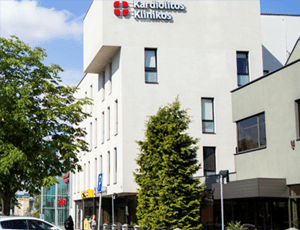Treatment cost

Kardiolita Hospital, Vilnius located in Vilnius, Lithuania is accredited by JCI. Also listed below are some of the most prominent infrastructural details:


Apart from in-detail treatment procedures available, Kardiolita Hospital, Kaunas located in Kaunas, Lithuania has a wide variety of facilities available for International Patients. Some of the facilities which are provided by them are Accommodation, Airport Transfer, Choice of Meals. Also listed below are some of the most prominent infrastructural details:
A ventricular septal defect, or VSD, is a condition where there is a hole in the wall between the two lower chambers of the heart, present from birth. It's the most common congenital heart defect and can occur alongside other heart issues. A small hole usually causes minor or no symptoms, but a larger one may require repair to prevent lasting damage and complications.
Ventricular septal defects (VSD) occur in around one-third of 1% of newborns, but it's less likely for adults to be diagnosed since the defect often closes naturally during childhood in 90% of cases. VSDs linked to heart attacks are exceptionally rare nowadays, with less than 1% of all heart attacks being associated with them, thanks to modern treatment methods.
The exact cause of ventricular septal defects (VSD) at birth remains unknown. However, it can be associated with other heart defects, heart conditions, or genetic disorders. The use of specific anti-seizure medications (sodium valproate and phenytoin) or alcohol consumption during pregnancy may potentially elevate the risk of a child developing VSD, although further research is needed to establish these as definite causes.
A rare known cause of VSD is its occurrence as a side effect of a heart attack.
Most ventricular septal defects (VSDs) are too small to pose significant issues, often closing on their own by age 6. In such cases, healthcare providers typically recommend monitoring for symptoms rather than immediate surgery. For moderate to larger-sized VSDs, repair is usually advised. The two primary methods are:
In both cases, the heart tissue eventually grows around the patch or occluder, incorporating it into the heart wall between the ventricles.
The recovery period after repairing a ventricular septal defect (VSD) varies depending on the chosen method. Transcatheter procedures generally result in shorter recovery times, measured in days or weeks. In contrast, surgical interventions require longer recovery periods, measured in weeks or months. Following either procedure, symptoms of a VSD typically decrease or vanish, contributing to improved post-treatment well-being.
Antibiotics will be administered to prevent infections like endocarditis. Regular checkups will follow for a while to ensure that the hole gets closed properly. To prevent blood clots the patient may be given aspirin. Apart from all these, for the first few months, activities will be kept limited till he or she is fit enough to exert more with physical activities.
Ask your healthcare adviser for the best multiple options and choose the one that meets your expectations
VSD Closure / Repair (Adult) package cost in Vilnius has different inclusions and exclusions. Some of the best hospitals for VSD Closure / Repair (Adult) offer a comprehensive package that covers the end-to-end expenses related to investigations and treatment of the patient. The comprehensive VSD Closure / Repair (Adult) package cost includes the cost of investigations, surgery, medicines and consumables. Extended hospital stay, complications after the surgery or new diagnosis may affect the overall cost of VSD Closure / Repair (Adult) in Vilnius.
VSD Closure / Repair (Adult) in Vilnius is offered by multiple hospitals across the country. The following are some of the most renowned hospitals for VSD Closure / Repair (Adult) in Vilnius:
While the speed of recovery may vary from patient to patient, they are still required to stay for about 18 days after discharge. This is important to ensure that the surgery was successful. During this time, control and follow-up tests take place to check for medical fitness.
While Vilnius is considered to be one of the best destinations for VSD Closure / Repair (Adult) owing to the standard of Hospitals, and expertise of doctors there are a select few destinations that provide comparable quality of healthcare for the procedure. Some of such cities are:
Apart from the VSD Closure / Repair (Adult) cost, there are a few other daily charges that the patient may have to pay. These charges may vary from 50 USD per person.
Patients who are interested in availing telemedicine consultation before they travel for VSD Closure / Repair (Adult) in Vilnius can opt for the same. Some of the surgeons offering this service include the following:
Some of the most sought after doctors available for online video consultation for VSD Closure / Repair (Adult) in Vilnius are:
| Doctor Name | Cost | Book Appointment |
|---|---|---|
| Dr. Vaidotas Zabulis | 212 | Book Now |
| Dr. Rimantas Karalius | 315 | Book Now |
The patient is supposed to stay at the hospital for about 3 Days after VSD Closure / Repair (Adult) surgery for monitoring and care. The doctors team review the patient's recovery during this time with the help of blood tests and imaging scans. Once they feel that everything is on track, the patient is discharged.
There are around 1 Hospitals hospitals in Vilnius that offer VSD Closure / Repair (Adult) to international patients. These hospitals have propoer infrastructure as well as offer good quality of services when it comes to VSD Closure / Repair (Adult) surgery. Apart from good services, the hospitals are known to follow all standard and legal guidelines as dictated by the local medical affairs body or organization.
Some of the most sought after doctors for VSD Closure / Repair (Adult) in Vilnius are: